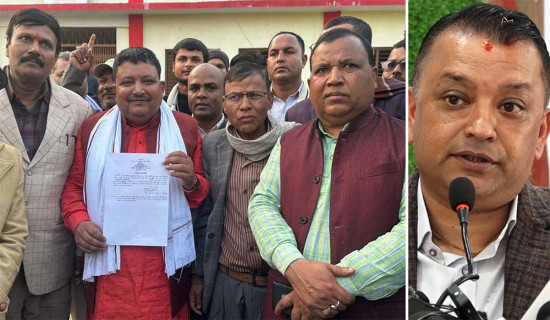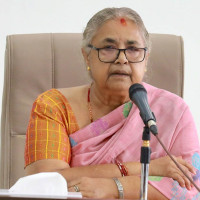- Wednesday, 21 January 2026
Civil servants should change old style of working
It is imperative to gradually enhance technical manpower and make service delivery at all levels—federal, state, and local, more technology-friendly. Nagendra Sapkota of Gorkhapatra talked to Chief Secretary Eaknarayan Aryal regarding the government’s policies and plans for effective service delivery, keeping in mind the demands of service users and the significance of Civil Service Day. Excerpts:
The government is celebrating the 21st Civil Service Day on September 7. In this regard, how government planned to make the civil service more people-friendly?
This year, as in previous years, we are marking the Civil Service Day with great enthusiasm. We have been promoting the theme “Professional and Creative Administration: Development, Prosperity, and Governance” for the past three years. Our focus this year is to provide services that are convenient, accessible, and timely, with a renewed commitment from civil servants. The government aims to adapt to new technologies and approaches, fostering creativity in service delivery to support development, prosperity and good governance.
We expect all employees to serve with integrity, morale, and dedication, aligned with the expectations of service seekers. We must develop a clean, competent and responsible civil administration. Employees at all levels must unite with a shared sense of purpose and determination to achieve common goals. As Chief Secretary, I am fully committed to supporting the Prime Minister and other government officials in addressing key governance challenges. Our collective goal is to ensure that government plans are implemented effectively, yielding the desired results for the public.
As Chief Secretary, what are your plans to make the overall civil administration more result-oriented?
Indeed, the service seekers have not always been satisfied with the services provided by the government, and there have been complaints. Civil servants act as a bridge between the service seekers and the government, and they must meet the expectations of the citizens. Employees must be managed according to their rank and be trained to provide technology-friendly services with honesty and dedication. The government has set clear policies, programmes, and budgets, and it is the responsibility of civil servants to implement them efficiently.
We are committed to fostering a culture of accountability and productivity. This year, we will reward employees who excel in their duties and hold accountable those who fall short. The outdated notion that “the work will get done, even if it is delayed” must be eradicated.
The Federal Civil Service Act has been delayed for a long time, weakening administrative federalism. When will this law be enacted?
The Federal Civil Service Bill has been registered in the House of Representatives and is currently under review at the State Affairs and Good Governance Committee. As soon as I assumed the role of Chief Secretary, I spoke with the Chair of the Committee, urging the swift enactment of this legislation. The absence of the Act has weakened administrative federalism, as employees were adjusted across federal, provincial, and local levels, often without their full cooperation or enthusiasm.
The Act is essential for the moral development and motivation of civil servants working at the local and provincial levels. Some provincial governments have passed laws that contradict the federal laws, creating disparities in retirement age, social security, and pension schemes, which in turn affect service delivery. Once the Federal Civil Service Act is enacted, these issues will be resolved. I urge all political leaders and members of the House of Representatives to expedite the passage of this crucial bill.
There have been complaints about the inefficiency of civil service mechanisms in producing the desired results of government’s policies, planning, programmes and budget. How can the civil service mechanisms be made effective?
All employees, from office assistants to the Chief Secretary, must be held accountable for their responsibilities, as outlined by the law. Each individual must complete their assigned tasks on time, adhering to principles of ethics and honesty. Over time, there has been a decline in accountability, which we must address. The problem arises when employees neglect their assigned duties in favour of other tasks.
To achieve results, those in positions of responsibility must lead effectively. Ministers and secretaries have been instructed to produce result-oriented outcomes, aligned with the government’s vision of a “Prosperous Nepal and a Happy Nepali.” Civil servants must work together, united in their commitment to achieving these national goals.
There are also complaints that the local level is not employee-friendly, particularly due to the reluctance of Chief Administrative Officers to serve at the local level. How can this issue be addressed?
The reluctance of employees to serve at the local level is not solely their fault. In some cases, local representatives have shown disrespectful behaviour toward employees, which has discouraged many from accepting local-level assignments. Additionally, some local representatives have attempted to appoint individuals of their choice to key administrative positions, which has undermined the effectiveness of local governance.
Local representatives should work with the employees sent by the government rather than attempting to appoint staff on their own. If an employee engages in misconduct, they can be disciplined according to the Civil Code. However, if appointments are made based on political considerations, it disrupts service delivery. In places where the Chief Administrative Officer has been in office for an extended period, we have seen positive results. Therefore, stability and cooperation between local representatives and employees are crucial for effective service delivery.
Service seekers often express dissatisfaction with the complexity and inefficiency of government services. How can this be improved?
The delayed enactment of the Federal Civil Service Act has resulted in a shortage of manpower in key offices, such as transport, district administration, and passport departments. These offices are not equipped with sufficient technology or skilled personnel. It is essential to modernise our service delivery systems and ensure that all offices are technology-friendly.
By increasing technical manpower and creating a positive work environment, employees can be encouraged to adopt a more service-oriented mindset. This will instil confidence in the public and improve the efficiency of government services.
Corruption has been a persistent issue, with many civil servants being suspended as soon as cases are filed against them. Has this impacted service delivery?
Indeed, employees in high-demand offices, such as transport, passport department, customs and district administration, have been disproportionately facing cases in the anti-corruption agencies. This has discouraged many from accepting positions in these offices, leading to significant staffing shortages and delays in service delivery. Around 2,000 employees have been suspended due to corruption investigations, which has further strained these offices. To address this, the government has been appointing technical-level employees on a contract basis to maintain service delivery.
Despite the country adopting the federal system, there are complaints that employees have not adapted to the changes in governance. What is the cause of this?
Adaptation to new systems depends on the individual’s mindset and willingness to change. The federal system has altered the way the state functions, and employees must adjust their behaviour and work processes accordingly. Those who cannot adapt to the new system should consider stepping aside, as their inability to change will hinder service delivery.
Employees must ask themselves why they have been entrusted with their current roles and take responsibility for adapting to the demands of the time. The old ways of working no longer suffice. On this Civil Service Day, I urge all employees to embrace the changes and work diligently for the betterment of the nation.
















